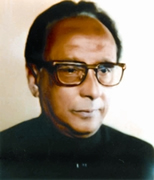Rahman, Md Zillur

Rahman, Md Zillur (1929-2013) President of Bangladesh. He was born on 9 March 1929 at village Bhairabpur in Bhairab thana of Kishoreganj district. His father Meher Ali Miah was a lawyer, chairman of Mymensingh Local Board and a member of the District Board.
Md Zillur Rahman passed Matriculation examination from Bhairab KB High School in 1945, IA from Dhaka Intermediate College in 1947, and obtained BA (Hons) degree in History from Dhaka University in 1952. In 1954, he got his MA degree in History and later obtained LLB degree from the Dhaka University.
While a student in Dhaka Intermediate College, Zillur Rahman came in close contact with bangabandhu sheikh mujibur rahman in 1947 during his campaign in referendum in Sylhet. Md. Zillur Rahman played an active role in the language movement in 1952. He presided over a student gathering held at Amtala (under mango tree) in Dhaka University on 19 February 1952. Zillur Rahman was one of the eleven student leaders who met at the pond-side between Fazlul Huq Hall and Dhaka Hall on 20 February 1952 and took the decision to break the prohibitory order under Section 144.
In 1953, Zillur Rahman was elected vice president of Student Union of Fazlul Huq Hall of Dhaka University. He was expelled from the University for his active participation in the Language Movement. However, in the face of student agitation the university authority was compelled to withdraw the order of expulsion.
During the united front election in 1954, Zillur Rahman was made the vice chairman of election steering committee for the greater Mymensingh district. He was also the president of erstwhile East Pakistan Awami Svechchha-sebak League. He was elected president of the Kishoreganj subdivision unit of Awami League in 1956. He took part in all the mass movements including the movement against military rule of Ayub Khan in 1962, six-point movement in 1966 and the mass upsurge of 1969. In the 1960s he was the general secretary of Dhaka District Bar Association. He was elected a member of the Pakistan National Assembly in 1970.
Zillur Rahman was one of the organizers of Bangldesh war of liberation in 1971. He was associated with the swadhin bangla betar kendra and with the publication of Jai Bangla, the organ of the Mujibnagar Government. The Pakistan Government sentenced him to twenty years of imprisonment in absentia, and confiscated all his properties.
After the liberation of Bangladesh, Md Zillur Rahman was elected the general secretary of bangladesh awami league in 1972. As a member of Bangladesh Constituent Assembly, Zillur Rahman actively took part in framing of the Constitution of Bangladesh. He was elected a member of the Jatiya Sangsad in 1973. He was elected general secretary of Bangladesh Awami League in 1974. He became a member of the Politbureau and the central committee of bangladesh krishak sramik awami league (BAKSAL) in 1975. He was one of the four secretaries of BAKSAL. After the brutal assassination of Bangabandhu Sheikh Mujibur Raman and his family in 1975, he was put behind the bars for 4 years. Zillur Rahman played an important role as member of the presidium of Bangladesh Awami League from 1981. In 1986 he was elected member of the Jatiya Sangsad. He suffered imprisonment again in 1986. He was elected general secretary of Bangladesh Awami League in 1992.
Zillur Rahman was elected member of the Jatiya Sangsad in 1996. Between 1996 and 2001 he was the member of the cabinet in charge of the Ministry of Local Government, Rural Development and Cooperatives. Simultaneously he performed the responsibilities of the deputy leader in the Jatiya Sangsad. In 1997 he was again elected general secretary of Bangladesh Awami League. He was elected a member of the Jatiya Sangsad in 2001.
Zillur Rahman led the party efficiently at a very crucial time when after the promulgation of state emergency in the country on 11 January 2007 and confinement of sheikh hasina, the president of Bangladesh Awami League, on 16 July 2007. As acting President of the party he made immense contributions in keeping the Party united and restoring democracy in the country with his political prudence and wisdom. He became a member of the Jatiya Sangsad in 2008. He played a pivotal role as the deputy leader of the Jatiya Sangsad.
Md Zillur Rahman was sworn in as the 19th President of the People's Republic of Bangladesh on 12 February 2009. The new president, in terms of constitutional procedure, was seen to be fulfilling all the responsibilities the office enjoined upon him.
Zillur Rahman’s entire career had been made and moulded in politics. As a career politician, he was eminently equipped to be part of a process which consistently emphasized the primacy of democratic order in the country. He was a parliamentarian who since his entry into national politics was hardly ever out of parliament. Zillur Rahman was exceptionally sophisticated, amiable and gentle by nature.
He died on 20 March 2013 while undergoing treatment in Mount Elizabeth Hospital in Singapore. [Abdul Awal Howlader]
